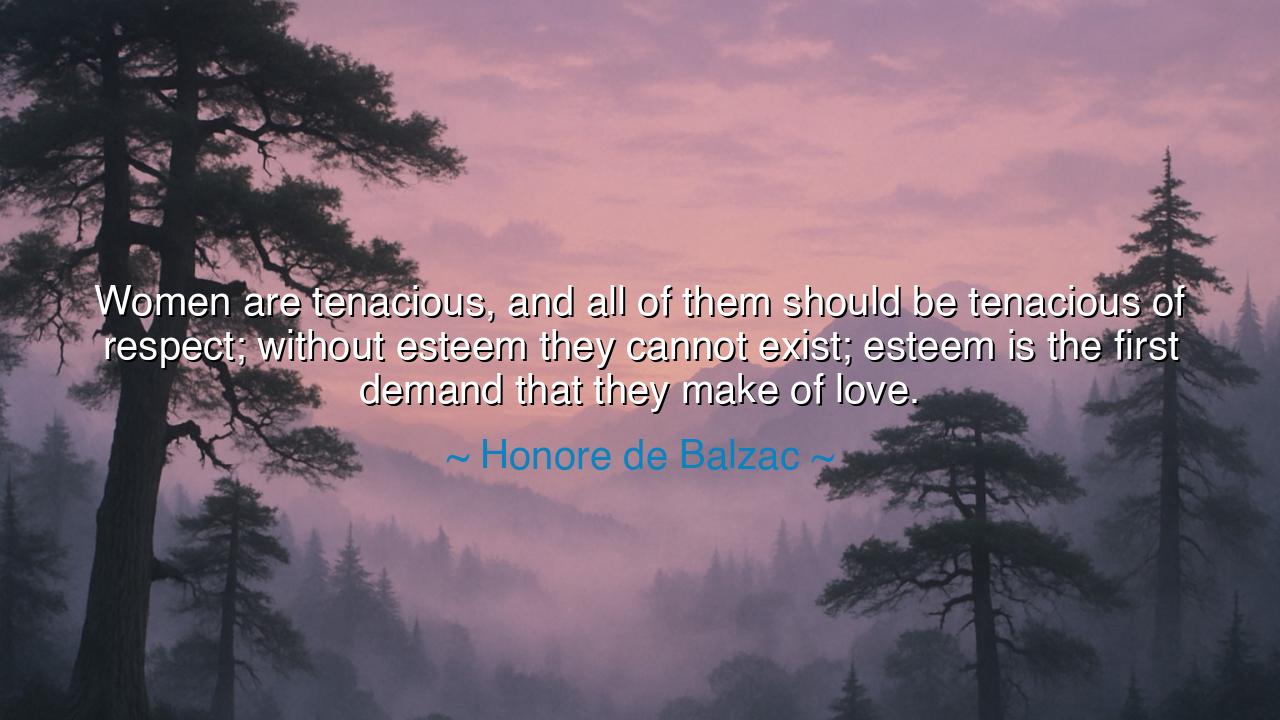
Women are tenacious, and all of them should be tenacious of
Women are tenacious, and all of them should be tenacious of respect; without esteem they cannot exist; esteem is the first demand that they make of love.






Hear the voice of Honoré de Balzac, who gazed deeply into the mysteries of the human heart and declared: “Women are tenacious, and all of them should be tenacious of respect; without esteem they cannot exist; esteem is the first demand that they make of love.” These words, carved from both observation and truth, speak not only of women, but of the essence of dignity itself. For what is love without respect, and what is devotion without esteem? They are hollow shells, shimmering on the surface but empty within.
The meaning of Balzac’s words is profound. He names tenacity as a natural strength of women—a refusal to surrender easily, a spirit that endures trial and rises against hardship. Yet he does not praise tenacity for ambition or conquest alone, but for the pursuit of what is most essential: respect. For he understood that love without respect is a prison, and affection without esteem is mockery. To be valued in love is not to be admired for beauty or desired for passion, but to be honored as equal, whole, and worthy.
In history we see this truth lived out. Consider Abigail Adams, who wrote to her husband John Adams, urging him as he worked with the Continental Congress to “remember the ladies” in the formation of the new nation. She was tenacious not for vanity, but for respect—for the recognition of women’s voices in the halls of power. Though her plea was not fulfilled in her day, her words became a foundation stone, echoing through the generations until women would at last gain the rights of citizenship. Here is Balzac’s truth: women have always demanded esteem as the first condition of love and justice.
The phrase “without esteem they cannot exist” speaks not of physical survival, but of spiritual survival. To be denied respect is to wither in the soul, to be unseen, unheard, unvalued. History shows countless examples of women bound in marriages where love was professed, yet respect withheld—where their existence was tolerated, but their dignity denied. Yet those who endured, those who demanded esteem, are the ones whose names live on. They prove that esteem is not luxury, but necessity, as vital to the spirit as bread is to the body.
And what of love itself? Balzac declares that esteem is its first demand. Love cannot flourish in contempt. True love, whether between man and woman, parent and child, or friends bound by loyalty, must be rooted in respect. Without it, passion decays into control, and tenderness rots into neglect. The ancients knew this, too: in Rome, marriage was honored not simply as a union of bodies, but as a union of dignities. To strip away respect was to destroy the very foundation of union.
The lesson for us is clear: whether man or woman, never enter into love that does not honor your dignity. Demand esteem, not as arrogance, but as necessity. And when you give love, give it with respect at its core. For love without esteem is a fleeting fire, but love built upon respect is an eternal flame, steady against the winds of time.
And so, let your actions follow. If you are a woman, remember Balzac’s wisdom: be tenacious of respect, and do not accept love that belittles. If you are a man, let your love be marked by esteem, not domination. In every bond you form, ask yourself: “Do I honor this person’s dignity?” If the answer is no, then love has not yet begun.
Thus remember the timeless truth: “Esteem is the first demand that they make of love.” Without respect, there is no love, only shadow. But where respect stands firm, love becomes not only passion, but partnership—an alliance of souls, enduring, radiant, and worthy of remembrance.






AAdministratorAdministrator
Welcome, honored guests. Please leave a comment, we will respond soon